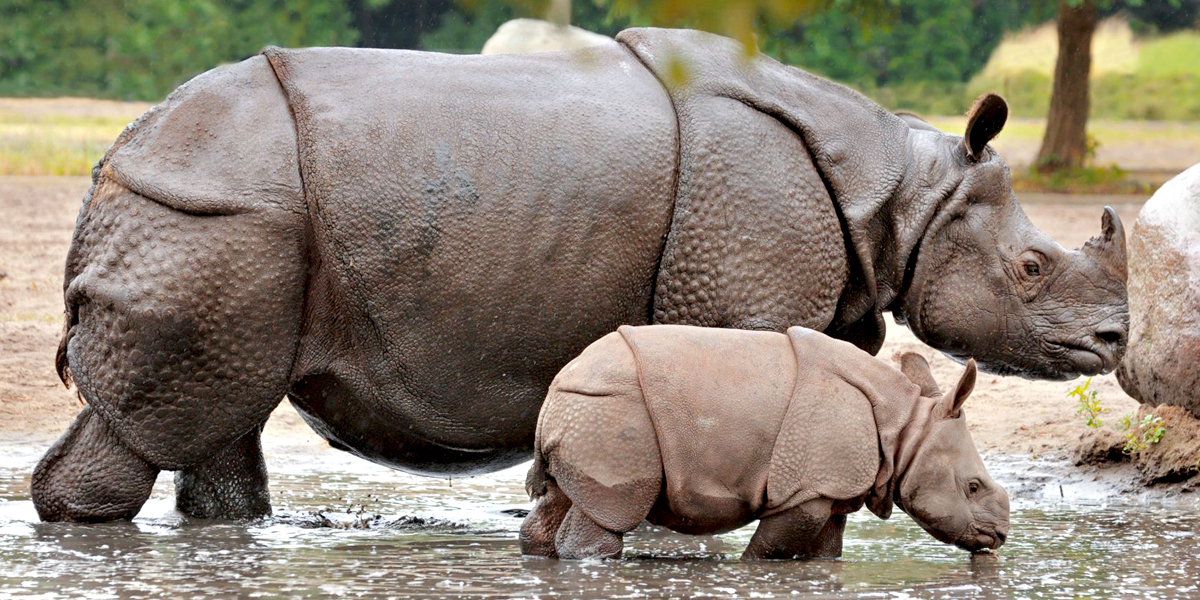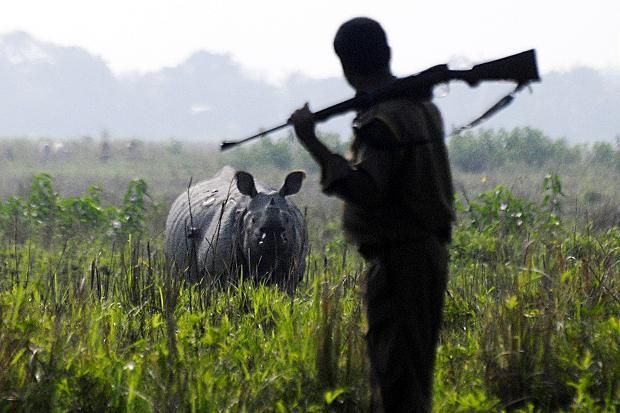

The Greater One-Horned (or Indian) Rhino has thick, silver-brown skin which creates huge folds all over its body. Its upper legs and shoulders are covered in wart-like bumps, and it has very little body hair. Photo credit: International Rhino Foundation
With legal immunity, Rangers at Kaziranga National Park (Kaziranga) in Assam, India can shoot poachers to protect the Indian one-horned rhinoceros. While the number of rhinoceroses killed has now dropped, the human shooting policy—started in 2013— remains controversial.
Local villagers and tribal peoples’ rights organizations, including London-based Survival International, feel the poacher-killing program is out of control. In 2015, 16 rhinos were killed compared to 23 people, raising concerns about “extrajudicial executions,” according to the BBC.
https://twitter.com/EcoWatch/status/727679336174764032 expand=1]
Rhino horn is highly valued as a medicinal and cultural product in multiple countries including China and Japan, where it can cost more than gold. Poachers come from crime syndicates and poaching gangs, who recruit locals. In response, India’s rangers have long been uniformed, with arms, and given license to prosecute offenders in the parks, according to Quartz.
Kaziranga has made great strides in rhino conversation. Only a few of the one-horned rhinoceros were living 100 years ago when the park was established. There are now more than 2,400, or more than 75 percent of their world population. Kaziranga is the area’s main tourist attraction, the BBC reported.

When the amount of rhinos poached in Kaziranga reached 27 in 2013, M. K. Yadava, then director of the park, penned a report proposing the poacher-shooting initiative. To justify his beliefs, he wrote “Crime against man, an animal which is found in great abundance and one who is largely responsible for destroying nature and ecosystems, must take a back seat when crime against mother nature is on the examination table.”
The current park director, Dr. Satyendra Singh, told the BBC, “First we warn them—who are you? But if they resort to firing we have to kill them. First we try to arrest them, so that we get the information, what are the linkages, who are others in the gang?”
Human rights campaigner Pranab Doley is investigating the park’s record keeping relating to the poacher shootings and has found it quite lacking. Many of the poachers killed are listed as unidentified and forensic reports are missing. “We don’t keep each and every account,” a senior Forest Department official told the BBC.

Several cases drew added attention to this policy, including the killing of a disabled man who wandered into the park and did not respond to a verbal warning, the shooting of a child in the leg and the alleged torture of an individual later deemed to be innocent.
In the first case, the family of little means felt unable to pursue a case against the rangers, who have significant government protection against prosecution. The park paid the medical bills and offered other compensation to the family of the boy who was shot, and it denies the torture accusations. An added danger for locals is that in some areas, there are no signs or fences to mark the edge of the park.
This conflict continues to embroil conservationists, government officials, native locals, animals, human rights organizations and poachers. The shooting policy may also be in violation of the 2006 Forest Rights Act, which, in part, “grants legal recognition to the rights of traditional forest dwelling communities.” In related news, plans to dramatically increase the size of Kaziranga entails villager displacement “with little due process” and “documented cases of violence and even death,” according to Quartz.
India isn’t the only country fighting poaching. Check out this video from the Hemmersbach Rhino Force working to end poaching in Africa:
[facebook https://facebook.com/EcoWatch/videos/1453085071371092/

 233k
233k  41k
41k  Subscribe
Subscribe 